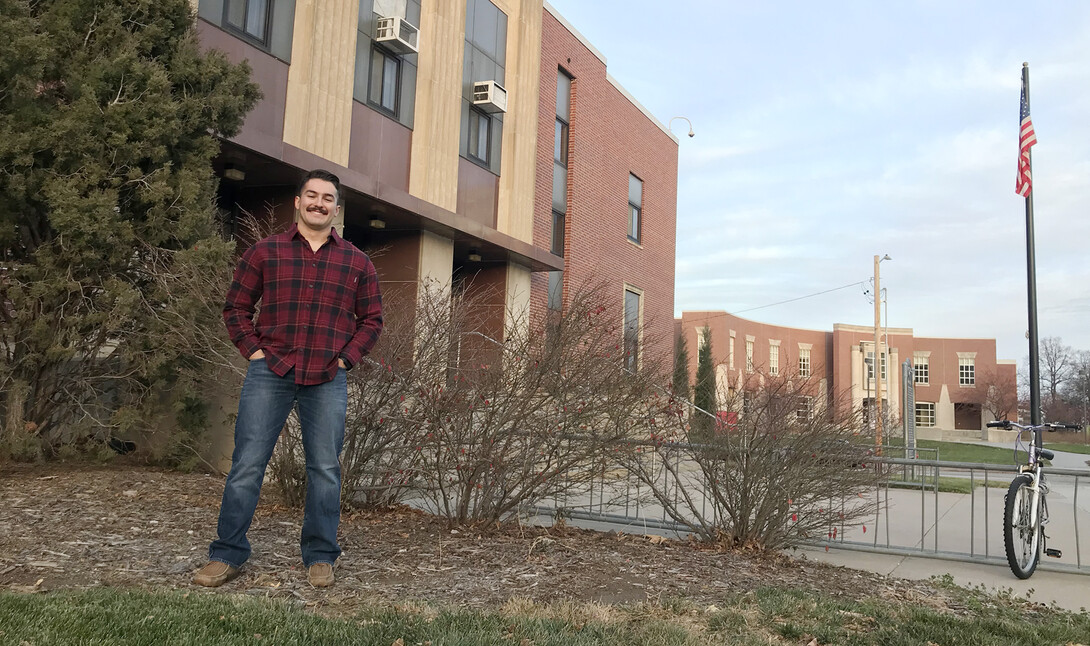
Three years ago, Rodrigo Venegas was at a crossroads in his young life.
At 22 years old, Venegas was leaving behind four years of service with the United States Marines and a long-term relationship that had crumbled. From Camp Pendleton in California, he was trying to decide where he’d go next.
“I thought I’d just go back to Nebraska to work with my dad,” Venegas said.
Venegas never considered college growing up. As a high schooler in Grand Island, Nebraska, he only wanted to serve his country in the military.
“I enlisted before my senior year, so that I could get out there right after graduation,” he said. “I always wanted to be a Husker, but in high school, I had no intention of going to college. I didn’t think I could afford it, and I didn’t think it was for me.
“But as I got older, I realized a college education is something that should be a goal for everybody.”
Wanting to be closer to family, Venegas enrolled as a Husker.
“I told myself, ‘college is paid for. There’s no excuse not to get my degree,’” he said.
But, the adjustment wasn’t easy. Venegas was a bit older than his classmates and military service had matured him far beyond his 22 years.
“I think this goes for everybody,” Venegas said. “You go back home after living a military life, and yeah, you have family and old friends, but, obviously, you’ve changed a lot in four years, and it’s really easy to get lost. It’s pretty easy to make excuses for a lot of things, because you feel like you don’t fit in, and it can be hard to make friends.”
Despite a rocky start, Venegas found support in the Military and Veterans Success Center at the University of Nebraska–Lincoln and with the Nebraska chapter of Student Veterans of America, of which Venegas is vice president. He found a mentor in upperclassman Jake Post, and soon he was thriving.
“I’ve been blessed with a lot of opportunity,” Venegas said. “I got to meet a lot of people through the student vets on campus and the Military and Veteran Success Center. They’ve honestly opened so many doors for me.”
Now in his third year as a construction management major in the College of Engineering, Venegas has taken advantage of nearly every opportunity he can find, including internships in Arizona in the summer of 2020, and a planned internship in Texas in 2021.
But leaving behind a military life wasn’t the same for many of his friends. Over the last two years, he’s lost three friends to suicide. The U.S. Department of Veterans Affairs has reported that on average, 16 veterans die of suicide each day. Venegas isn’t sure if there is any one issue driving the epidemic of suicide among his fellow veterans, but he’s trying to do his part to prevent more.
“I lost two buddies just this summer,” Venegas said. “It’s just happening too much.”
Venegas is much quicker to pick up the phone and call or text his friends than he used to be, adding that he believes his generation has lost touch with person-to-person communication, and that they need it now more than ever. He willingly shares his own experiences of uncertainty and sadness, in the hopes that being open and honest will help others do the same.
“You know, (adjusting to civilian life and college) was an experience that wasn’t the most pleasant at the time going through it, but I’m kind of grateful because it’s made me who I am now,” he said. “You know, it’s great to be able to help other people, and I try to as much as I can.”
His drive to help others also led him to get involved with the Things They Carry Ruck March, an event each November prior to the Iowa-Nebraska football game to bring awareness to the epidemic. The ruck — a military term for hauling gear from one point to another — traditionally covers the 322 miles between Iowa’s Kinnick Stadium and Memorial Stadium in Nebraska, and veterans take shifts in groups to cover the miles, carrying 20-pound backpacks to remember those lost to suicide. This year, with the COVID-19 pandemic, the event will be done by individuals, who will log miles and take photos of their own journeys. Venegas is leading the charge.
“The Ruck March means a lot to me, and with COVID, we were worried that we wouldn’t be able to do anything this year,” Venegas said. “But then we came up with a virtual approach, which is better than not doing anything at all, because we’ve had so many people tell us personally that this event saved their lives. A lot of the people who participate are vets, and it rebuilds that sense of camaraderie that you thought you lost.”







